Daniel Jacob Radcliffe was born on 23 July 1989 in Fulham, London. His parents are casting agent Marcia Gresham (née Jacobson) and literary agent Alan Radcliffe. Daniel’s father is from Banbridge in Northern Ireland, coming from a family with a Protestant background. His mother, on the other hand, traces her family to South Africa, though as a Jewish family they originally came from Lithuania, Poland, Russia, and Germany.
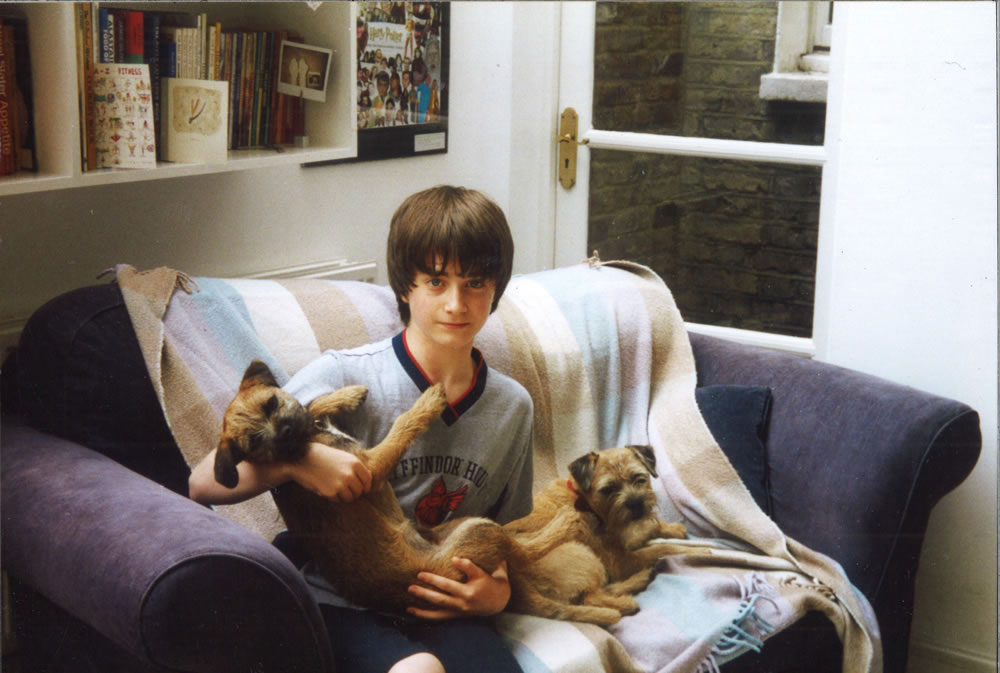
The future child actor was brought up in West London and at age 11 he was cast as Harry Potter, catapulting him to fame. His dad gave up his job to be Daniel’s chaperone. Over the next 10 years, Daniel and the fictional hero whom he played grew up together. Daniel is grateful for the support that his parents gave him in order to help him handle this extraordinary time.
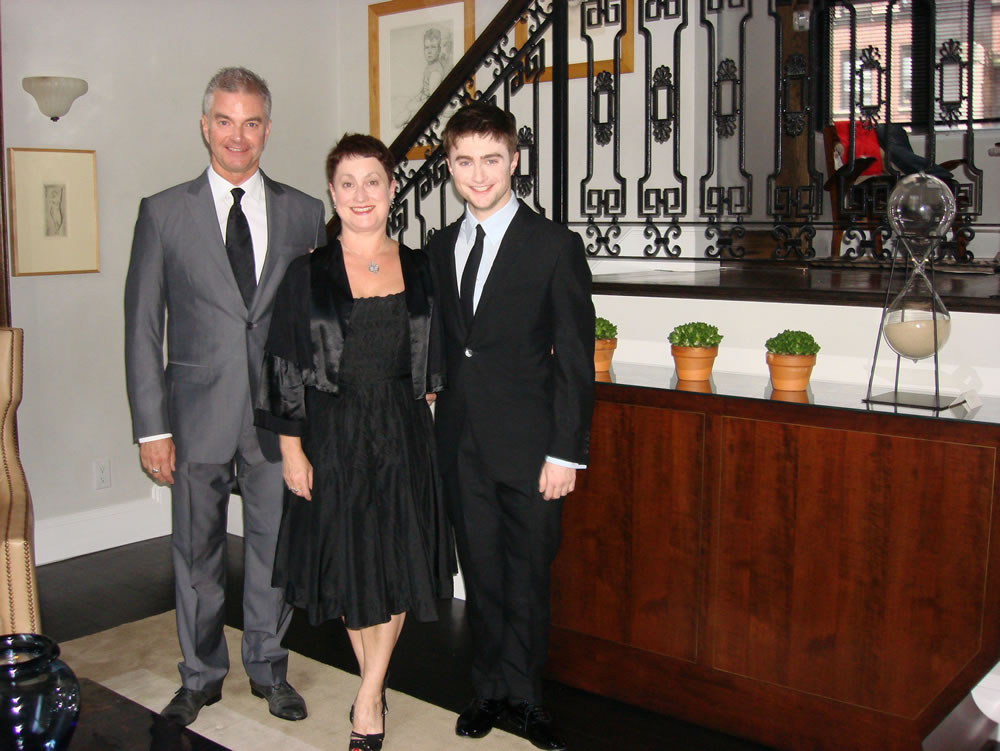
To steer a kid through that with as much humour and calm as they did is, I think, very impressive.
When it comes to his ancestry Daniel knows just a tiny amount about his family history. This opportunity to take part in the 16th series of the UK genealogy series on the BBC is set to put that straight.
On his paternal side, he is aware of a story about four brothers who went off to fight in World War I, whilst on his maternal side, Daniel believes that there is Eastern European Jewish ancestry. Daniel can’t remember what his great grandfather’s name had been “I want to say Phil but that’s not right!” but does know that he had a jewellery business. There was a story about it being robbed, and a few months later he took his own life.
In the first programme of the Wall to Wall produced series, Daniel is keen to discover if his ancestors have passed down any of their traits to him or to his parents. Our celebrity starts exploring with the aid of a note written by his mum, who has also sent him a family photo album. Along with this came a family tree – drawn up just before Daniel was born in 1989 – put together by his “Granny Pat”. In the programme he identifies a photo of his great grandmother, Raie, with Granny Pat as a baby. Daniel is amused by his baby grandmother’s wild hair. “It looks like somebody’s put a punk into a Victorian child’s dress”, he jokes.
The Gershon Dynasty
Granny Pat had grandly titled the family tree “The Gershon Dynasty”. His grandmother’s maiden name, however, had been Patricia Gresham an anglicised version of the original Jewish family name “Gershon”. The TV show sees him wondering whether it had been her decision to change their surname, and when it was that this happened. From the family tree that his grandmother had drawn up he can identify that her parents had been Raie Jacobs and Samuel Gershon. Samuel was the great grandfather who Daniel believed had taken his own life after a jewellers had been robbed. The family tree also reveals to Daniel that Samuel was one of nine children born to Louis Gershon and Jessie Greenwall and that he was the first of their children to actually be born in England while the others had been born in South Africa and the Orange Free State. Daniel’s great-great grandparents had been married in South Africa, a fact which surprises Daniel as he had assumed that this far back in his family tree, this line of the family would have been living in Eastern Europe.
In this episode of the show Daniel heads to North London to meet a descendant of great-great grandparents Louis Gershon and Jessie Greenwall also called Louis Gershon. Louis is the son of the youngest of Sam’s 8 siblings and he has a picture of his grandfather (Daniel’s great-great grandfather), Louis Gershon. When the photograph is held up next to Daniel’s face there is a remarkable resemblance to the actor. Present-day Louis shows Daniel a 1901 census which shows that the family was living in Hackney at the time, as shown below.
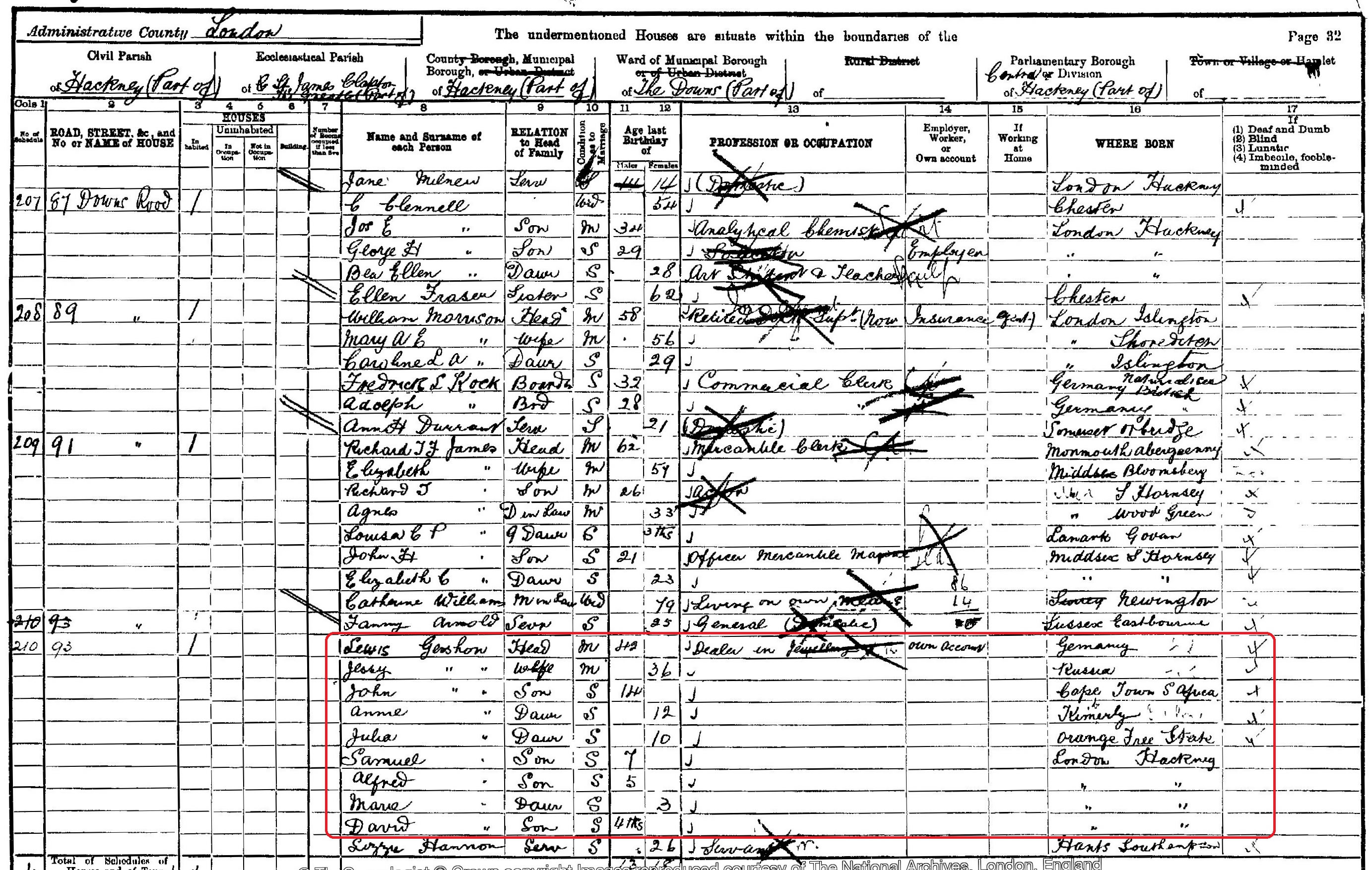
Scrolling down the document we can see that Louis (Sr) had been born in Germany and his wife, Jessie, in Russia. Several of the children were born in South Africa, where Louis was one of the thousands of treasure hunters who, after diamonds were discovered there, had flocked to the area around Kimberley in the late 1800s. From there he brought his family to the UK when he became a jewellery dealer, setting up his business in Hatton Garden.
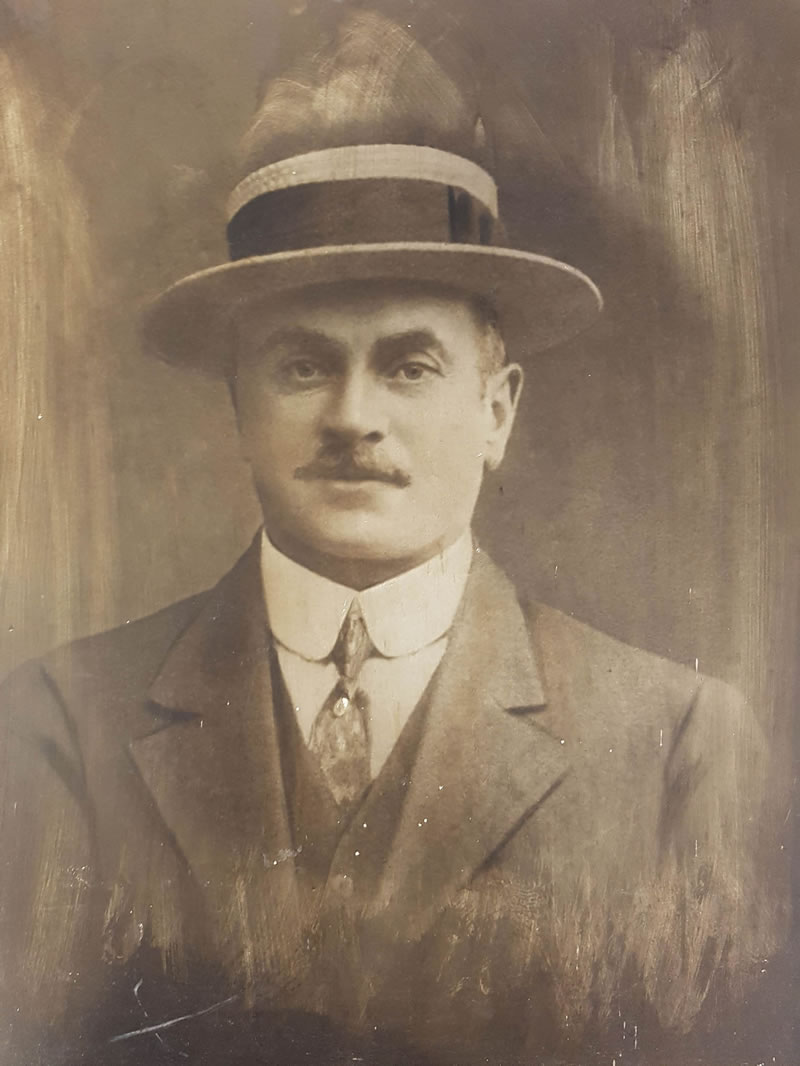
Hatton Garden in London’s city centre is the historic home of the jewellery trade, and in the programme Daniel meets a historian who shows him a 1905 listing of the business Gershon & Scheier at 35 Hatton Garden. Using TheGenealogist’s Trade, Residential and Telephone records we can find that the business was still recorded at that address in the 1910 Kelly’s directory.
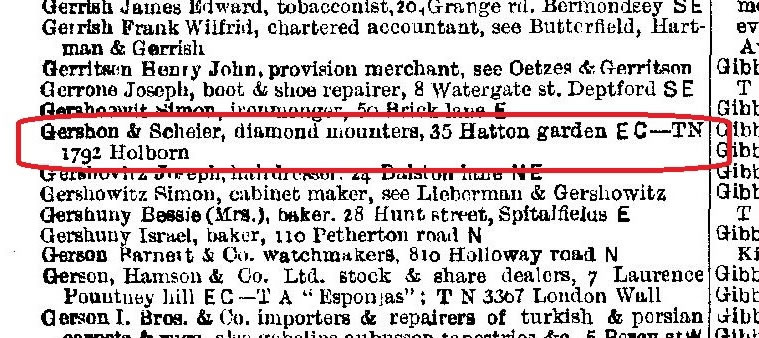
By using TheGenealogist’s powerful new Map Explorer we can see that some parts of the neighbourhood have changed from Louis Gershon’s time, while much is the same. The large Brewery that can be seen in the historical map has gone to be replaced with modern buildings and lanes.
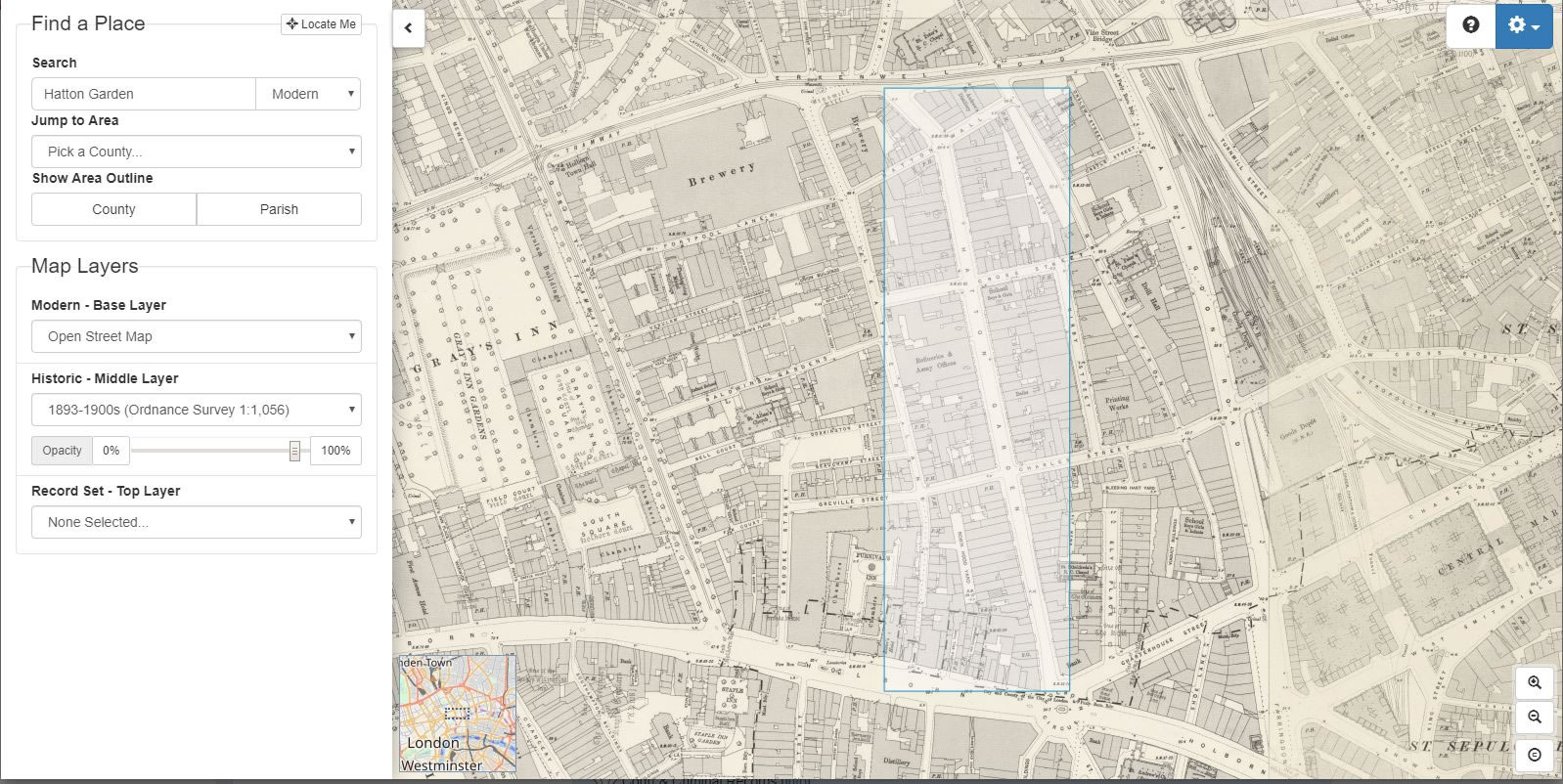
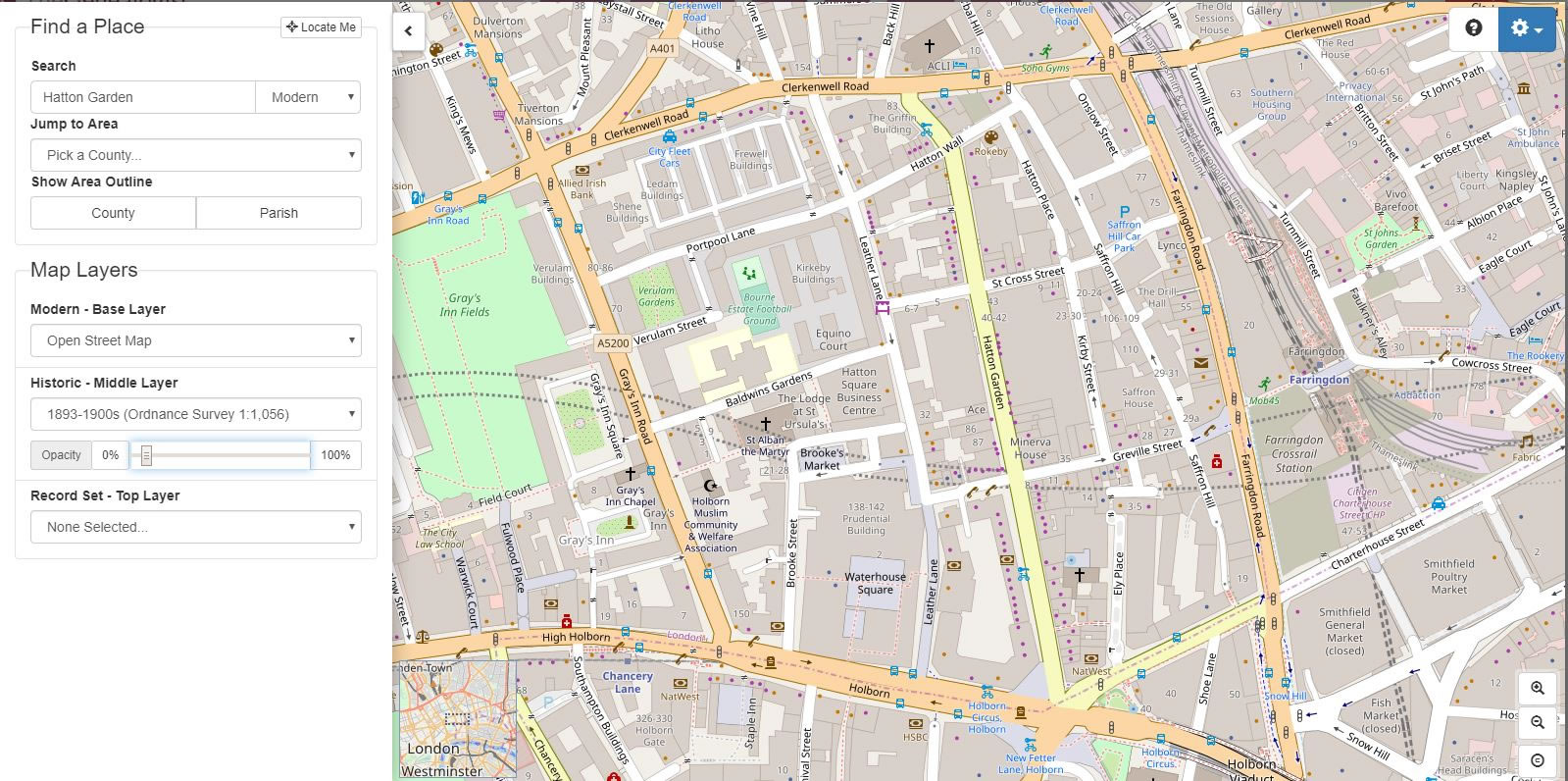
The television programme’s historian next takes Daniel through to a small workshop, similar to that in which his great-great grandfather would have worked over 100 years ago. Daniel is able to see a diamond mounter demonstrate a technique reminiscent of the skills that would have been practiced in the early 20th century. The actor is impressed by the delicacy of the “mini-engineering” that he is shown. Daniel is shown a document from 1917 that discloses that Louis was on a list of “Directors or Managers of the African Wholesale Jewellers”. At the time the company was worth £10,000 this is the equivalent of half a million pounds in today’s money.
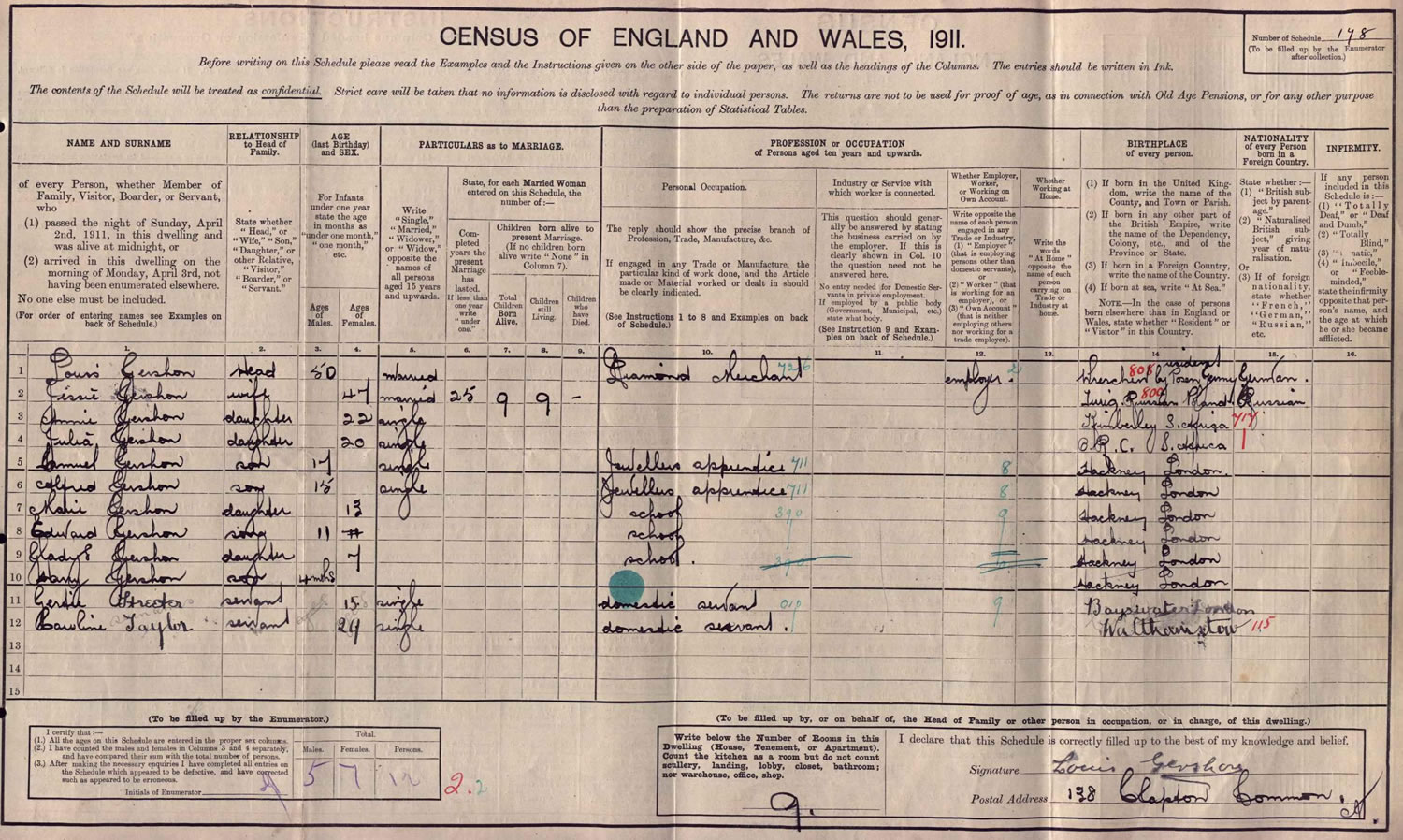
But what of Daniel’s great grandfather, Samuel, or Sam as he was known? We can find the Jewish Chronicle report of his Barmitzvah in 1907 at the South Hackney Synagogue from a search of Newspapers and Magazines on TheGenealogist, and then the 1911 census shows that at the age of 17 Sam was working as a jeweller’s apprentice. By the time of his marriage to Raie (Rachel) Jacobs 10 years later, he had become a fully-fledged Diamond Merchant.
Access Over a Billion Records
Try a four-month Diamond subscription and we’ll apply a lifetime discount making it just £44.95 (standard price £64.95). You’ll gain access to all of our exclusive record collections and unique search tools (Along with Censuses, BMDs, Wills and more), providing you with the best resources online to discover your family history story.
We’ll also give you a free 12-month subscription to Discover Your Ancestors online magazine (worth £24.99), so you can read more great Family History research articles like this!
Daniel reflects that the business must have been a point of pride. By 1921 Sam’s father Louis had died. Raie and Sam married in Southend on Sea and so the TV show sees Daniel heading there to find out more about his ancestors.
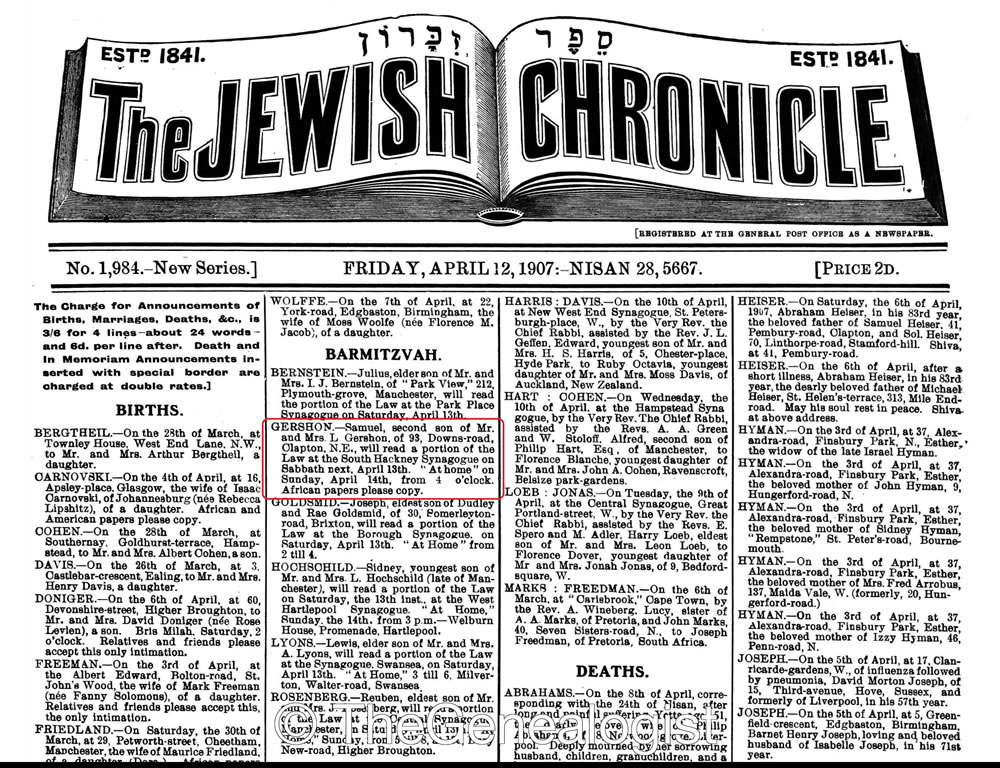
In Southend Daniel is able to meet up with a historian who shows him some studio photographs of Sam and Raie that had been taken in the late 1920s. In the photos, the couple are a similar age to Daniel, who notes that “a pipe probably does put a few years on you.”The substantial homes, gardens and seafront drew people to this affluent town.
Around this time the young couple are comfortable enough to be able to take a roundtrip cruise from Liverpool to Lisbon, Madeira and the Canary Islands. TheGenealogist’s Passenger List records find Sam and Raie from Athol Lodge, Wilson Road, Westcliff on the June 1923 trip. Westcliff-on-Sea, a suburb of Southend-on-Sea, was their home at the time. Sam would have commuted to work in Hatton Garden every day where the family business had now become “Gershon Brothers” and was run by Sam in partnership with his brother Edward. Daniel notes that his relative’s business would appear to be thriving…but he knows that family stories tell of there being a robbery and that Sam had then taken his own life.
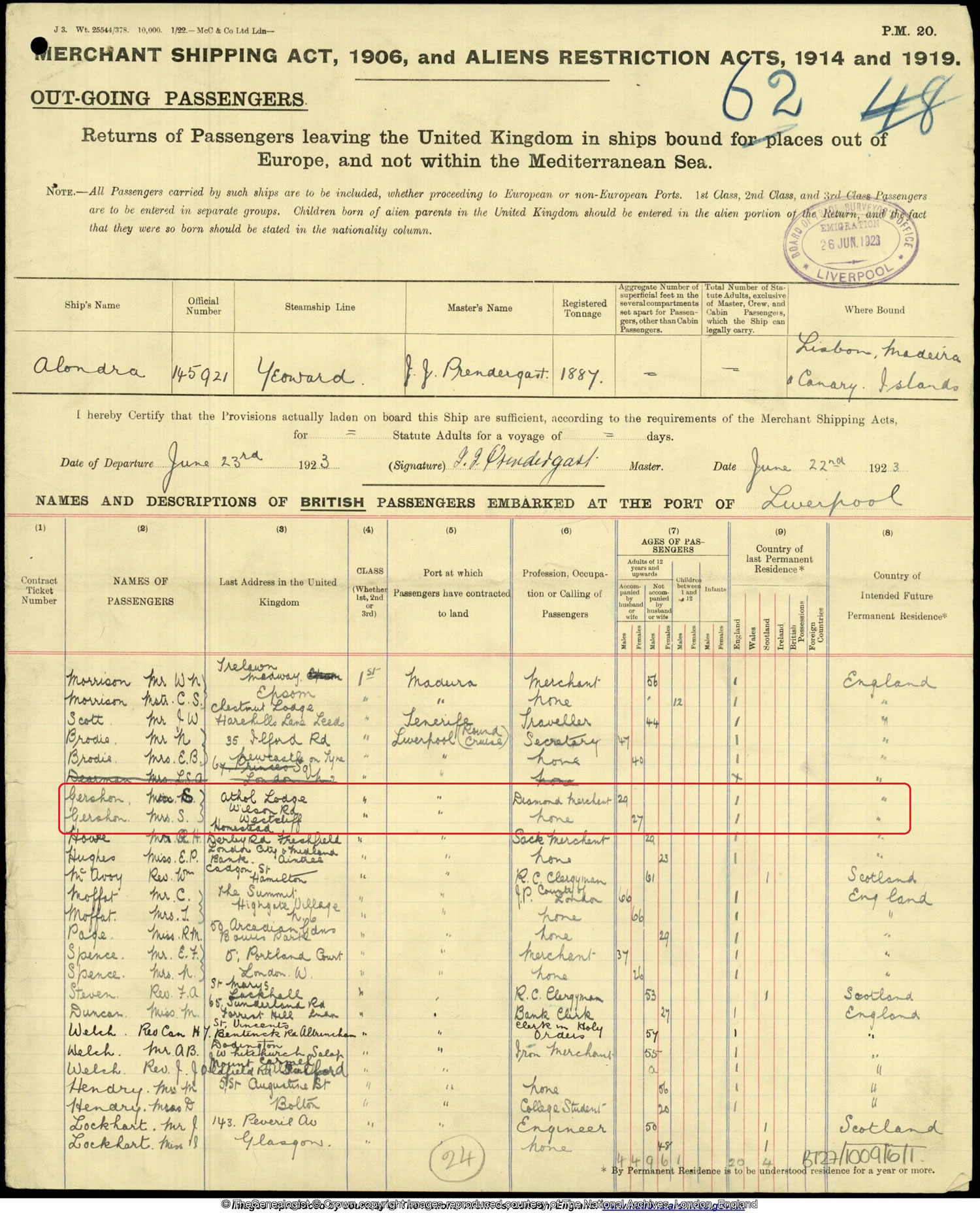
By the 1930s Samuel and Raie are now living in Northwick Avenue in Kenton. A search of Jewish Seatholders on TheGenealogist discovers that their address at that time was 50 Northwick Avenue, Kenton, Harrow. It was in 1936 that things came to a head with the business and events culminated with the death of Sam.

Daniel makes a search of newspapers online to see if he can find out what had happened to his great-grandfather. He reads various headlines: “Night raid on jewellers”, “Safe ripped open”, “Thieves force open safe”. Daniel reacts with surprise when he discovers that the alleged crime made the papers across the country. The programme sees Daniel meet a criminologist at the scene of the crime: the Hatton Garden address of Sam’s and his brother Edward’s business.
The criminologist explains that the investigation by the police showed that there was no evidence as to how the perpetrators had entered the building. On the back of this the police file suggests that the crime was possibly an inside job – the basis for a fraudulent insurance claim. The Gershon brothers were in debt for a similar amount to the value of what was stolen, and they had previously claimed on their insurance for similar incidents. This pointed towards there being a pattern of fraudulent claims and so leading to them discounting that there had been a burglary.The police file also contains a piece of testimony from an informant; Daniel is taken aback to read: “Jews are so frequently responsible for the bringing down of their own business premises”. This statement shocks Daniel:
There’s a lot to dig into in that one sentence. It’s very jarring to see being a Jew to be taken as a piece of evidence in itself.
Anti-Jewish attitudes, however, were not uncommon in the years leading up to World War Two, when The British Union of Fascists, led by Oswald Mosley embraced an increasingly Nazi style of antisemitism. In 1936 the year of the robbery this erupted into violence in London at the Battle of Cable Street when Mosely’s fascists clashed with anti-fascist demonstrators.
With regard to the robbery of the Gershon Brothers’ business, the police decided that it was possibly bogus but that they didn’t have the evidence to prosecute Sam and his brother. Daniel looks at a newspaper report that includes a dramatic photograph of Sam, fainting and being supported by several men on hearing about the robbery. The accompanying article reports that Sam was “too ill to see the police” for three days after the incident. The pressure was now on Sam. He would have been fully aware that the chance that the insurance company would pay out was unlikely given the belief of the Police that it was a fraud. On top of this he was under intense media scrutiny. Daniel is forced to confront whether he believes that his great-grandfather was innocent or not.
I suppose I worry because I know that Sam took his own life and so that makes me wonder if that was, you know, guilt. But by the same token it could be that once this is written about you and once there is this speculation about you…everything he’s worked for and that his father had worked for, as well, has sort of been destroyed…
With the police report to go by Daniel speculates that, given the evidence, Sam and his brother may have staged the robbery to defraud the insurance company.
Whatever happened, the effect was not good
It was five months later that Sam killed himself. Daniel heads to Hertfordshire near to where Sam died and meets a historian who shows him copy of the coroner’s report on his great-grandfather’s death. As well as revealing that Sam suffered from shock for 14 days after the incident, the report includes a witness statement to the coroner’s court from Edward, Sam’s brother. Edward explained that Sam was very worried at this time as, if the insurance company did not pay their claim, the firm would go bankrupt. The historian points out that in the 1930s men were meant to be providers and protectors for their families; to be seen to fail at this was very difficult. Yet Edward stated that his brother Sam “was wonderfully happy at home.”
Daniel still feels sorry for his great-grandfather, whether he was guilty or not – “anyone can back themselves into a corner and it’s hard to feel angry at someone for that.”To add to the tragedy the insurance company did eventually settle the claim!
The Coroner’s report also contains a transcription of the sucide note that Sam wrote to his wife Raie, which Daniel takes away with him to read. It begins, “Doll darling…” Daniel is touched by his great-grandfather’s turn of phrase: “the way he says things is not dissimilar to some things I would say and things I might call people.”
You want to just reach into the past and just go ‘whatever you’re going through, you have so much to offer the people who are around you still…you have so much to give to them. And, they still would all have loved you.’
Daniel identifies with Sam’s worry, and is saddened that it became so overwhelming that he had to take a way out.
Daniel learns that his great grandfather Samuel’s suicide also made headlines. Daniel imagines the impact this must have had on his great grandmother Raie and her children, including Daniel’s Granny Pat. It was at this time that the family name was changed from Gershon to Gresham. So Daniel now understands that it was not simply as an attempt to Anglicise the surname but the revelation that it was Raie who took this step – just three weeks after her husband’s death – points to Raie wishing to put this scandal behind the family. Daniel admires the “really extraordinary shielding work going on from Raie to protect her daughters.”Daniel comes to a conclusion that having always been surrounded by strong women in his life:
Access Over a Billion Records
Subscribe to our newsletter, filled with more captivating articles, expert tips, and special offers.
It’s fascinating and exciting to find that maybe the strongest of all of them was this woman I knew almost nothing about.
Great Uncle Ernie’s War
Turning to his father’s side of the family, Daniel is keen to investigate a story from the First World War about some of his family who went to war. In the programme Daniel heads to County Down in Northern Ireland so as to get close to where his father grew up in Banbridge and where his aunt Linda still lives. The family story that Daniel has heard tells of four of his paternal great-great uncles four brothers who had fought in the Great War; he doesn’t know if any or all of them lived or died. Daniel holds this story close to his heart as when he starred in the First World War drama My Boy Jack, Daniel had kept a picture of one of them his great-great uncle Ernie in his trailer on location in order to help him feel a personal connection to the period.
With his aunt Linda, Daniel sifts through family photos. Before he gets to these great-great-uncles he is shown a picture of his great-grandmother, Florence who was always known as Flo. It comes as a nice surprise to Daniel that he had in fact met his great grandmother Flo when he was just a baby. Flo was younger sister to the four brothers who fought in the First World War; their parents being called Elizabeth and Tommy McDowell. Daniel takes a look at some photos of the brothers: Jimmy, Joe, the youngest brother Edmund, and then Ernie. His Aunt Linda has an envelope containing a substantial bundle of original letters written by and to Ernie. Daniel’s great grandmother Flo had held on to and treasured them, and passed them down the family. Now they are given to Daniel and he gratefully takes them away with him.
When he is on his own in Belfast, Daniel is able to begin to read his great-great-uncle Ernie’s letters. Daniel finds it extraordinary that he can get to know Ernie’s voice through these letters and he imagines how important Ernie’s assurances to his mother that he was okay would have been. The letters back to her son also are very poignant as Daniel’s great-great-grandmother relates her anxiousness to hear from each of her sons in turn. But it is not just letters between the mother and her sons that Daniel discovers in this bundle as there are also some very affectionate love letters to Ernie from someone called ‘Jeannie’ – “we will give them all a good day when we are getting married won’t we love”. Daniel notes that “someone was very keen on Ernie!”
Daniel then meets up with a historian who is able to explain the importance of letter writing during the First World War. This was the first generation, they explain, due to compulsory education up to 14, that could write letters, even though they were working-class men and women. In the First World War, parcels and letters from home were thought to be a vital morale booster for soldiers and the authorities regarded these as important to soldiers’ welfare as the food and other supplies they needed. Two billion letters and over a hundred million parcels were sent during the course of World War I with letters taking just 2 or 3 days to reach men at the Front.
Daniel’s great-great-uncle Ernie was sent overseas very early in the War, but he returned to the UK to be treated in England for frostbite before being allowed to recuperate at home for a time before being sent back to his unit. This was one of several periods of home leave that Ernie, like many soldiers, experienced during the course of the war. One of the unforgettable letters that Daniel gets to read relates how, when Ernie was wounded by gunshot, his own brother Joe in the same regiment the Royal Irish Rifles carried him to the dressing station on his back.
Chillingly, midway through the war, Ernie’s correspondence stops abruptly.
Fearing the worst Daniel heads to the local church in Banbridge where he finds a roll of honour. The list of men killed in action includes his great-great uncle Ernie McDowell, but none of Ernie’s other brothers appear on the memorial.
Who Do You Think You Are? arranged for Daniel to meet a local genealogist who has a letter written to Ernie’s mother by another soldier who had been with Ernie at the Front.
We were just after arriving in the trenches and your boy and two more chaps from Belfast was going into a dug out to take off their packs when a shell landed which killed the three of them. I’m very sorry to say none of them did live to say a word to anyone.
The genealogist also has a record of a marriage in the Church of the Holy Trinity, Banbridge that shows that on Valentine’s Day 1915 Ernie married his sweetheart Jeannie while on home leave.
A lot of very sad things have happened to various parts of my family but I can’t be sad about it because…everyone was loved…and ultimately that means that, even if their time on earth ended prematurely and sadly, it was worth having.
TheGenealogist has a large collection of military records and within them we can find Daniel’s great-great-uncle Ernie recorded twice in the casualty lists when he was wounded in February 1915 and again in July 1915. Tragically he also appears in July 1916 in the section of those who were reported as Killed-in-Action, as well as in the records for Soldiers Who Died In The First World War.
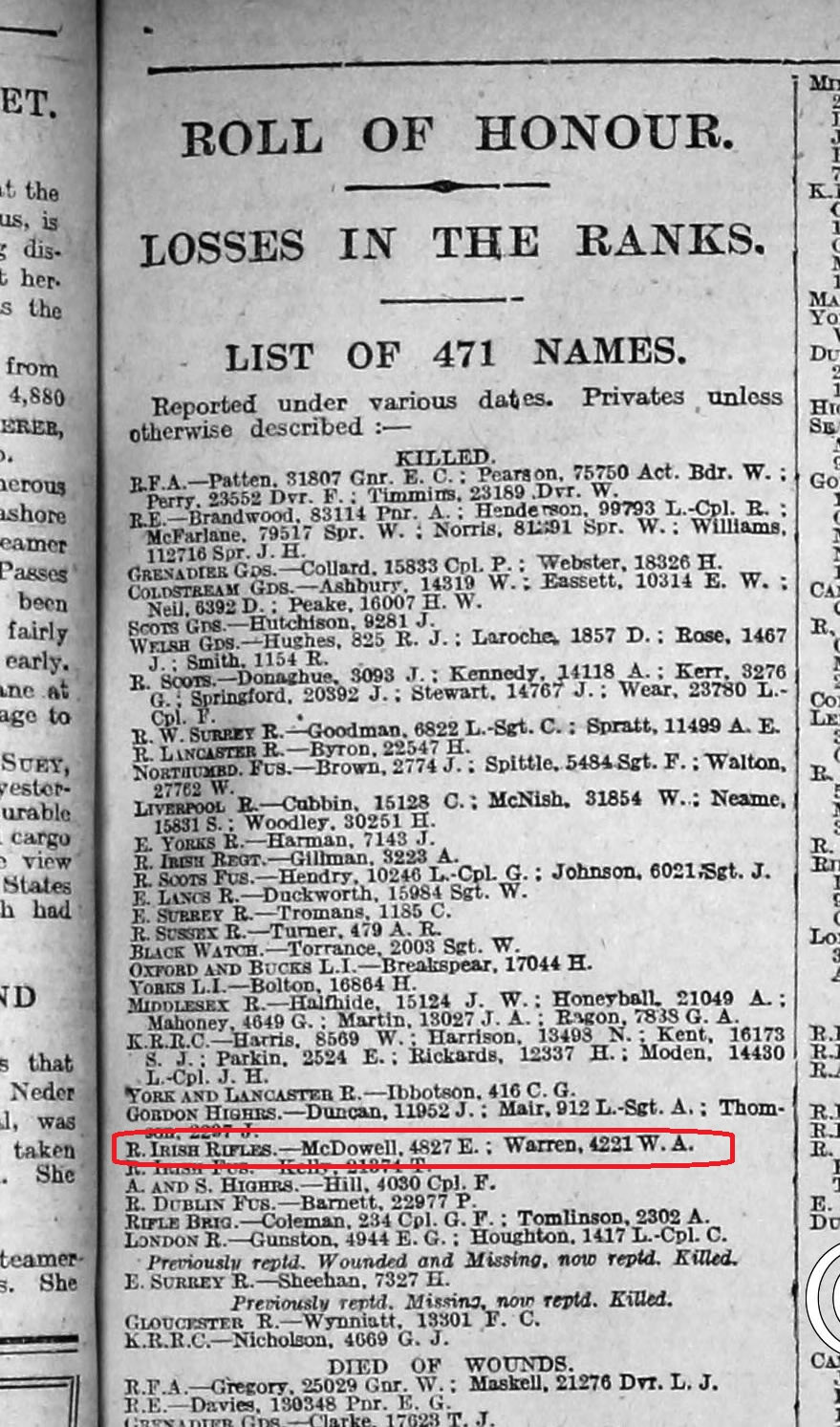
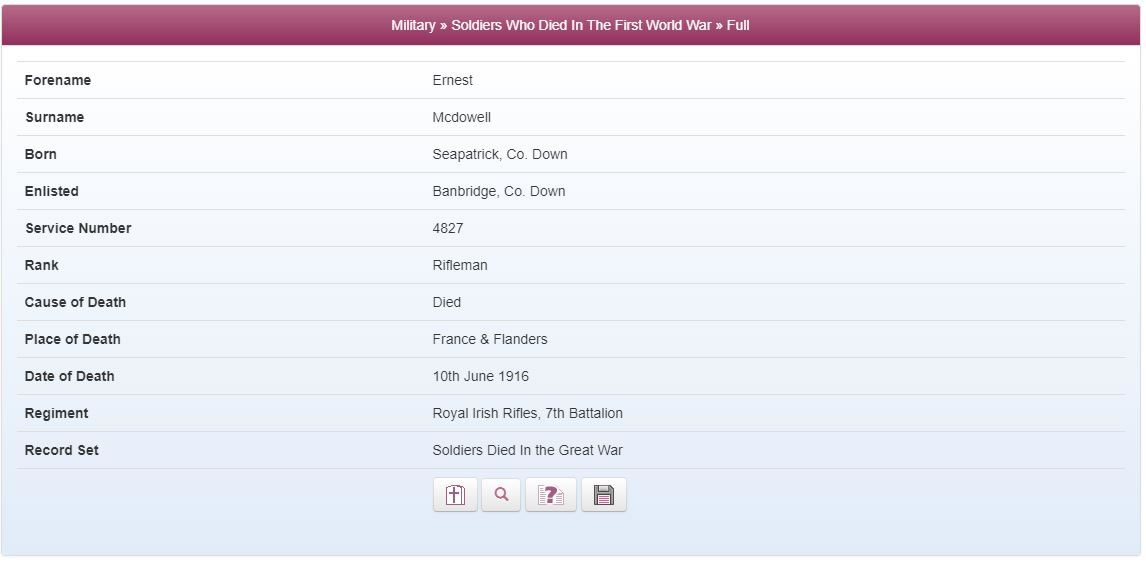
Sources:
Press Information from IJPR on behalf of the programme makers Wall to Wall Media Ltd
Extra research and record images from TheGenealogist.co.uk
BBC/Wall to Wall Ltd Images
Click here to view Harry Potter’s Family Tree on TreeView, the online Family Tree Builder






